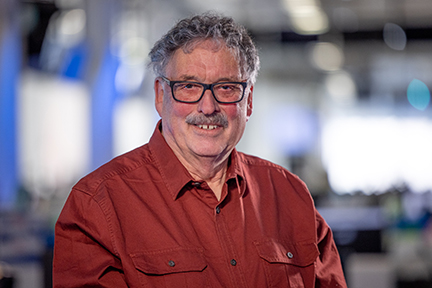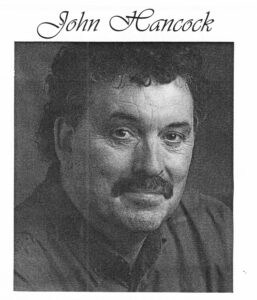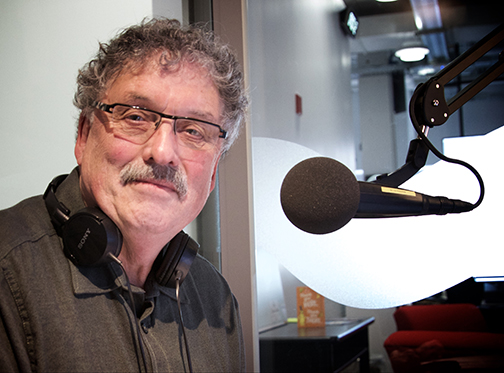
Some towns and cities are known for their athletes, but a strong argument can be made that Preston High School seemed to be a breeding ground for sports broadcasters.
John Hancock is one of several prominent locals who established a long career in broadcast journalism.
“My dream since childhood was to do play-by-play for hockey and baseball,” he said “I always did play-by-play during the street hockey games I played with my friends on Highland Park in Preston.”
Born in Galt, Hancock grew up in Preston and attended Preston High School, where he would later be inducted into the school’s Hall of Fame.
For Hancock, his career with CBC was a dream come true. After high school he attended the broadcast journalism program at Conestoga College and eventually went on to work for CBC, where he covered every Olympic Games from 1980 onward. The Athens Games in 2004, marking the 100th anniversary of the modern Olympiad, was his ninth Games.
Although he was born at the advent of the television era, from an early age he had an affinity for sports broadcasting.
“I also used to hit stones out into the water with a baseball bat while at our rented cottage in New Liskeard pretending it was a baseball game.”
Hancock would write down all the names of the ball players on a piece of paper at his side as he hit the stones into the lake. “The farther I hit them, the bigger the hit; home runs were the most difficult. Most kids liked swimming, I liked hitting stones into the water like I was a batter hitting pitches.”
When at Conestoga, he made his entry into the profession that would characterize his life’s work.
“My earliest foray into broadcasting was at the age of 19 providing some colour commentary for Galt Hornets senior hockey games with CKCO sportscaster Bill Inkol.”
Another PHS graduate, who, like Hancock before him, studied radio and television arts at Conestoga—Randy Steinman—was also helped along the way by Inkol.
“It was great working with Bill during my first few months at Conestoga College. I approached Bill about helping him with his broadcast of the Hornets games in 1970/71, the year they won their second Allan Cup.”
At college he was sports director for the college station CKER, and gained experience with Central Ontario Television (CKCO-CKKW-CFCA) in radio operations, then began two years in news and sports. That’s when he began doing colour commentary of OHA Senior games with Inkol. He also did newsroom election coverage, wrote commercials and did on-air news and sports. He also gained experience, while at college, with CBC Toronto, as well as with Junior A hockey games in Kitchener.
“My first full-time job in broadcasting after graduating from Conestoga in 1973 was as an all-night host of a country and western show simulcast on Kitchener radio stations CKKW/CFCA.” He lasted until Christmas. “I didn’t know a lot about country music (and didn’t like it). I remember the first song I played, Try a Little Kindness by Glen Campbell. I used to get into trouble with the programmers for deviating from country to rock or other genres.”
From 1972 to 1978 he worked at private radio stations in Hamilton, London, Kingston and Wingham as news reporter, editor, sportscaster and sports director. This included Kingston’s CKLC Radio, where he began a regular phone-in sports talk show with guests like Harry Sinden and Montreal Expo VP and GM Jim Fanning. During that time he also wrote a weekly sports column for the Kingston weekly paper.
In 1978 Hancock began with CBC National News and Sports in Toronto, where he also prepared an investigative report on the Olympic installations at Lake Placid, which was broadcast on The World at Six.
In 1979 he covered the World Speed Skating Championships in Quebec City for CBC National Sports.
In March 1980 Hancock joined CBC Radio 940 and Montreal’s sports team where he began as sports commentator on Daybreak and Quebec A.M. He also contributed features to other radio and TV programs, and was to have been part of the CBC Radio team covering the 1980 Moscow Olympics, which were boycotted by Canada and several other western nations including the USA.
His first Olympic experience was earlier that year when he covered the Lake Placid Winter Games in New York. In 1984 he worked the Los Angeles Olympics, and in 1988 covered both the Calgary Winter Games and the Seoul Summer Games, where local runner Doug Consiglio competed, and where Ben Johnson gained notoriety.
In 1996 Hancock co-hosted CBC Radio’s coverage of the Atlanta Olympics. “I called play-by-play of the gold medal won by Canada’s Donovan Bailey in the 100 metres race at Atlanta,” he recalled. “An under-10-second play-by-play. Nerve wracking!”
He was a reporter and host at the 1998 Nagano Winter Olympics in which locals Luke Sauder, Kevin and Cindy Overland and Derrick Campbell, all competed.
Like most broadcasters, Hancock’s job was not to make the news, but report it, though he turned the tables on at least one occasion when he made national headlines.
Hancock typically delivered his cross-country sports report from Halifax, and he and CBC Ottawa’s morning show host, John Lacharity, were engaged in some friendly banter when Hancock’s home studio phone rang.
Hancock interrupted his live sports report to Ottawa to take the call. His listeners waited 17 seconds for the call to end before Hancock resumed his report.
Lacharity was caught off guard when the call occurred at 8:55 a.m., while they were live. “Frankly, I wasn’t sure what the heck was going on,” said Lacharity later.

Hancock took the call, while live on air, and chatted amiably with his caller, CBC Calgary sportscaster Tom Spear.
Lacharity asked Hancock what had just happened when Spear and Hancock’s conversation ended.
Hancock explained who the caller was, and apologized, before resuming his report as if nothing had happened.
Later Hancock said he didn’t know what all the fuss was about, explaining he always left his studio phone on in case late-breaking news came in. He delivered 20 sports reports within the span of four and a half hours without the aid of any assistants, excepting a lone technician in Toronto.
He said it was only the second time in his career that his phone had gone off during a live broadcast, and besides, he added, listeners don’t like to listen to sportscasters who just deliver the scores.
“The odd time I do crazy things,” he said. “You’ve got to provide colour. I think they like to hear things a little different. It was a moment of levity.”
“John has a wonderful sense of play,” said Lacharity, “and he manages—in ways I can’t quite explain—to weave this …seamlessly into what actually is a pretty credible sportscast.”
There have been many highs throughout Hancock’s lengthy career. “My biggest thrill was calling the play-by-play on CBC Radio nationally for the gold medal hockey games for Canada’s men and women at the Salt Lake City Olympics in 2002.” Canada won gold in both games.
“I was so nervous before the games, I thought I was going to be sick.”
Other highlights included calling Gataen Boucher’s Olympic races in speedskating at the 1988 Olympics in Calgary near the end of his career.
At CBC he had the opportunity to work some international baseball.
He’s had a varied and successful career. ‘I was always very proud of being nominated for an ACTRA award in the 1980’s, not for any particular story, but for the work I did every day.”
He won the first award given to a reporter/broadcaster for coverage of university sports in Canada, and was also honoured by Mount St Vincent University in Halifax with an award for coverage of university sports in Nova Scotia.
He got the chance to travel with the Montreal Canadiens to their training camp in the fall of 1989, going to Moscow, Sweden and Latvia. “I got to see where Canada beat the Soviets in Game 8 of the summit series at Luzhniki Palace of Sports in Moscow.”

During that sojourn, the Canadiens played an exhibition game against Red Army. “The fans started throwing bottles at the players after a Montreal player flattened a Soviet player,” he recalled. “I remember filing a story from Red Square in 1989 while on that trip about the unrest of the people in Moscow and how they wanted change. This was just before the fall of communism.”
That was 33 years before the current Russian invasion of Ukraine.
Apart from his sportscasting career, he enjoys jazz and blues music. “Montreal pianist Oliver Jones remains a close friend of my wife Roberta, my daughter Lauren and me.”
Jones used to accompany him to Montreal Expos games in the early 1980’s and sit in the press box. “He said it was his dream to play the national anthem at an Expos game. I approached the team and they made it happen soon after.”
He wrote a piece of music in 1983 called “Lovely Lauren,” dedicated to his daughter who later started her career in broadcasting when she produced a national jazz show on CBC radio.
“Lauren (daughter) and I also did a two-hour national radio special for a New Year’s Day show on CBC called Raised on Jazz.” She was just 19 at the time.
In the spring of 2022 Hancock is still going strong.
“I still love going in every day and talking to hosts on morning shows across Canada. It’s a great way to make a living.”
Hancock is being inducted to the Cambridge Sports Hall of Fame in the same year that Galt Arena, where he got his start doing colour commentary, turns 100. “I remember how good this team (Hornets) was and how enjoyable it was to call the games.The playoffs were a long grind; I only did home games with Bill but it was a good start to a sports career that is now nearly 50 years old and counting.”
